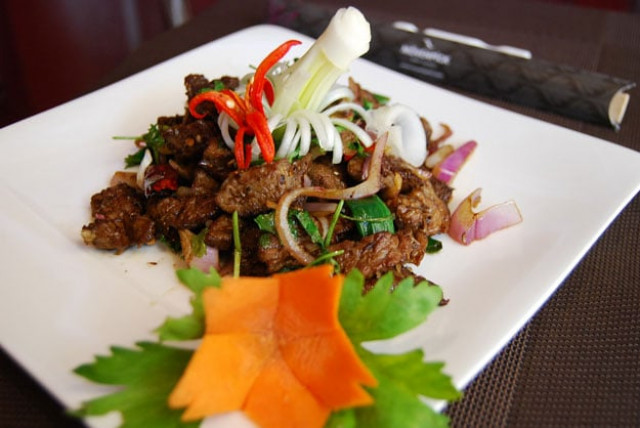Introducing authentic Chinese cuisine to Karachi
Can we do without our Pakistani-Chinese fusion dishes?

PHOTO: MOVENPICK
No appetite for La Cucina
The new eatery, Lotus Court, at Movenpick hotel in Karachi, however, is not like your familiar Chinese restaurant in the city; the dishes that leave its kitchen stay true to their Chinese roots. In a quest to introduce a truly Chinese experience to Pakistani diners, the eatery hired a native Chinese chef, Yang Jiayu, who has prepared his traditional home food for over 30 years. Having worked in five-star hotels around the globe, including India and Bahrain, Jiayu believes it is his responsibility to deliver authentic Chinese dishes to customers flocking to his restaurants.
 PHOTO: MOVENPICK
PHOTO: MOVENPICK“I have tasted Chinese food being sold at different outlets in Karachi and was very disappointed at how distant their flavours were from the dishes served in China,” says Jiayu, adding that if he jumps on the bandwagon of fusion cooking, he would disappoint the men from his country visiting Lotus Court. Having spent just a few months in Karachi, the 53-year-old chef is keen on giving Chinese food an accurate representation in the country, and in the process of doing so, giving Chinese diplomats and delegates a taste of home away from home.
Not your usual menu: Naan Dhaba — where traditional naan meets Western flavours
 PHOTO: MOVENPICK
PHOTO: MOVENPICKJiayu also has a team of graduates from renowned culinary schools in the metropolis to assist him in his mission. However, working alongside Jiayu is not an easy feat for most amateur cooks. Since most of the young new chefs are only familiar with Chinese fusion dishes, they are learning as they go. Chinese ingredients by themselves are a vast field of study. Dried mushrooms, cured meats, salted fish and bean pastes are only the beginning. In addition to exploring a vast pantry of new ingredients, the team faces the daunting task of learning new cooking techniques for which they received no formal training in college.
Although Jiayu rarely loses his cool in the kitchen, the master chef is very demanding. He makes sure everything is done according to his tastes and to ensure that, he even makes the list of ingredients himself and, if need be, gets the items flown into the country.
 PHOTO: MOVENPICK
PHOTO: MOVENPICKTalking about cultural difference between the Asian countries he has worked in, Jiayu shares Pakistanis are more curious about the dishes they are served. As a result, customers often call the head chef to explain the foreign flavours in the dishes.
Phenome-Naan: A contemporary twist on a timeless classic
 PHOTO: MOVENPICK
PHOTO: MOVENPICK PHOTO: MOVENPICK
PHOTO: MOVENPICKTo serve their obsession of all things Chinese, the hotel also observed the 3,000-year-old practice of Feng Shui – a system of law practiced in Chinese houses to invite good energy through arrangement of furniture, use of colours, lighting and accessories – while designing the restaurant. But just few a months into business, it remains to be seen whether the masses are ready to relearn what they identify as authentic Chinese cuisine.


















COMMENTS
Comments are moderated and generally will be posted if they are on-topic and not abusive.
For more information, please see our Comments FAQ